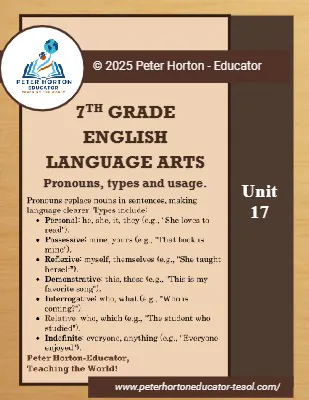8th English Language Arts Unit 6
Effective Learning Strategies for Students
Learning how to learn is as essential as acquiring content knowledge. For example, imagine a poor man unable to feed his family. At first, giving him $50 provides temporary relief, but on the other hand, teaching him to fish and giving him a fishing pole helps him for a lifetime. In the same way, mastering various learning strategies, like 25 different methods, empowers individuals to adapt, solve problems, and thrive in diverse situations. Moreover, this approach fosters self-sufficiency and long-term success, and ultimately, it transforms lives.
Unit 6: The Best Practices in Teaching and Learning Theories and Assessment Methods
Benefits of Learning How to Learn!
To begin with, learning things typically means acquiring specific knowledge or skills, like memorizing historical dates or solving algebraic equations. In contrast, learning how to learn is about understanding the learning process itself. In other words, it’s developing strategies and skills that help you learn more effectively, no matter the subject. Put simply, it’s like knowing the game’s rules instead of just playing it.
Teaching and Learning Experience: 20 Benefits of Learning How to Learn
As 8th graders, you are at a pivotal point in your education where understanding how to learn effectively can set the stage for your future success. Therefore, learning how to learn is not just about acquiring knowledge; it’s about developing skills that will help you navigate your educational journey and beyond. With this in mind, let’s explore the 20 benefits of learning how to learn, providing explanations, scaffolding, modeling, and examples to help you grasp these concepts.
Boosts Confidence
Explanation: Knowing how to learn makes tackling new subjects less intimidating.
Modeling: When you approach a challenging topic, remind yourself of the strategies you can use to understand it.
Example: If you’re learning about algebra, instead of feeling overwhelmed, you can break down the problems into smaller steps, which boosts your confidence as you solve them.
Improves Memory
Explanation: You’ll develop techniques to remember information better.
Scaffolding: Use mnemonic devices or visualization techniques to help retain information.
Example: To remember the order of operations in math, you might use the phrase “PEMDAS” (Parentheses, Exponents, Multiplication and Division, Addition and Subtraction).
Enhances Understanding
Explanation: You’ll not just memorize but also understand concepts deeply.
Modeling: Instead of rote memorization, try to explain the concept in your own words.
Example: When studying the water cycle, explain how evaporation, condensation, and precipitation work together, rather than just memorizing the terms.
Encourages Curiosity
Explanation: You’ll become more curious and ask better questions.
Scaffolding: Practice asking open-ended questions about what you’re learning.
Example: Instead of asking, “What is photosynthesis?” you might ask, “How does photosynthesis affect the environment?”
Fosters Independence
Explanation: You’ll rely less on others for your learning.
Modeling: Set personal learning goals and seek out resources to achieve them.
Example: If you want to learn about coding, you can find online tutorials and practice on your own, rather than waiting for a class.
Increases Adaptability
Explanation: You’ll adjust to different learning environments easily.
Scaffolding: Be open to trying new study methods or tools.
Example: If your teacher introduces a new online platform for assignments, embrace it and learn how to navigate it effectively.
Promotes Problem-Solving
Explanation: You’ll be better at finding solutions independently.
Modeling: Approach problems with a systematic method.
Example: If you encounter a difficult math problem, break it down into smaller parts and tackle each part step by step.
Supports Lifelong Learning
Explanation: You’ll keep learning effectively throughout life.
Scaffolding: Cultivate a habit of seeking knowledge beyond the classroom.
Example: Join clubs or online courses that interest you, such as photography or creative writing, to continue learning new skills.
Facilitates Time Management
Explanation: You’ll learn to organize your study time efficiently.
Modeling: Create a study schedule that allocates time for each subject.
Example: Use a planner to block out time for homework, studying, and breaks, ensuring you stay on track.
Cultivates Critical Thinking
Explanation: You’ll analyze and evaluate information critically.
Scaffolding: Practice questioning the information you receive.
Example: When reading an article, ask yourself about the author’s perspective and the evidence they provide to support their claims.
Conclusion
In summary, learning how to learn equips you with a toolkit that’s useful not just for school but for any new skill or subject you want to master in life. Indeed, it’s a superpower that keeps on giving. By embracing these benefits, you’ll not only enhance your academic performance but also prepare yourself for future challenges and opportunities. So, let’s embark on this journey of learning how to learn together!










